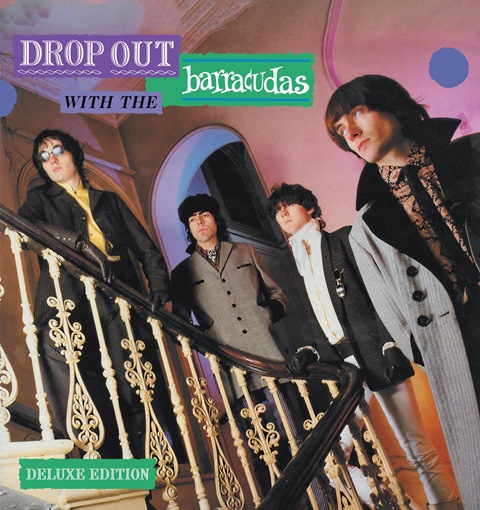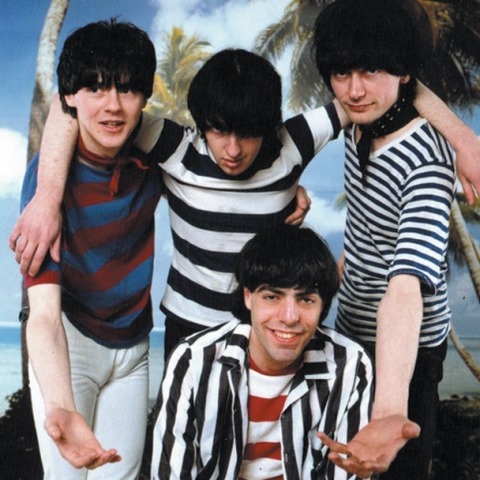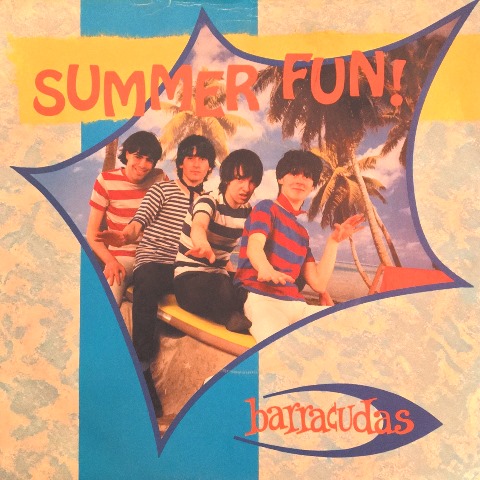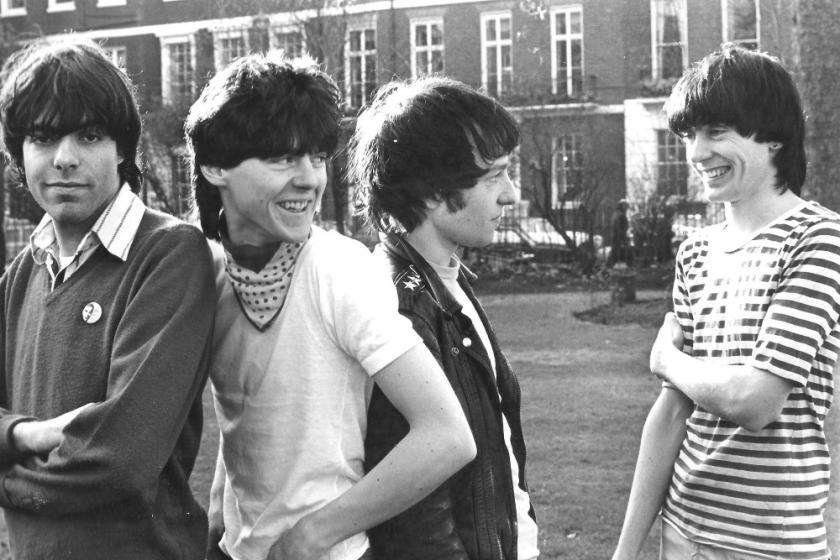From around July 1977, Jeremy Gluck began contributing to the UK music weekly Sounds. Amongst his pieces were features on The Lurkers, The Rezillos, 999 and his home country Canada’s punk band The Viletones. He’d also written about Generation X for what ended up as the final issue of Sniffin' Glue. In parallel, along with guitarist Robin Wills, he was formulating the band which became The Barracudas.
The pair met at an early 1977 show where The Unwanted, the punk outfit Wills was in, was the support band. Once The Barracudas debut single was out – August 1979’s independently released “I Want my Woody Back” – they swiftly became the cover stars of Sounds. The quartet were pictured holding a surf board. “Surfing music is back,” said the piece (not written by Gluck).
 “Lead singer Jeremy Gluck, [is] a gangly, sallow faced Canadian youth who used to spend his time writing for various rock magazines, including, occasionally, this one,” it continued. Gluck was quoted as saying “One thing working for Sounds taught me was get in a group! Forget your past."
“Lead singer Jeremy Gluck, [is] a gangly, sallow faced Canadian youth who used to spend his time writing for various rock magazines, including, occasionally, this one,” it continued. Gluck was quoted as saying “One thing working for Sounds taught me was get in a group! Forget your past."
The first recording version of The Barracudas – Gluck, Wills, bassist David Buckley, drummer Nick Turner – issued five singles and one album, February 1981’s Drop Out With The Barracudas. The LP, non-album single tracks, a few demos and their final studio recording of the period (when they had added a keyboard player) take up Disc One of a three-CD clamshell set built around Drop Out… From 1977 onwards, the other two discs collect demos, the “I Want my Woody Back” single, some rehearsal material and very early live snapshots. There are 21 previously unreleased recordings – the remainder previously cropped up on the archive comps The Big Gap and Through The Mysts Of Time. The cut-off point is 1981, after which Buckley and Turner left the band. A fair amount of the songs heard as demos were re-recorded for release by post-Buckley and Turner line-ups, so this set acts as a pointer to the future as well as being about its particular timeframe. All four Drop Out-period band members have been interviewed for the set’s booklet. The guiding hand is that of Wills.
The band took a while to get to the point when they made the first single. Initially they were called R.A.F. – Rock and Fun – and had short-stay bassists and drummers. In 1977, playing a cover version of Sixties garage band The Standells’s “Barracuda” (a rehearsal version is heard: the song was also later covered by The Jesus and Mary Chain) gave them the name and a sound they’d aim for.
 Beyond the advantageous Sounds angle, other contextualising strands emerge. While Gluck was writing and Wills was putting The Unwanted behind him their drummer Nick Turner, who came on board in late 1978, worked at the bar of Camden’s Music Machine, a prime London venue. Pre-Barracudas, he passed through The Raincoats. For a while, The Barracudas rehearsed at a central London squat where early Slits member Kate Korus lived (in 1979, she was founder member of The Mo-Dettes). Joe Strummer was a frequent visitor there. Former Sex Pistols Steve Jones and Paul Cook lived close by and were also to hand. Sid Vicious had sold his leather jacket to Wills. From 1980 or so, Turner was running a south London rehearsal studio used by Public Image Ltd as well as his own band. The Barracudas first single came out on the Cells label, which issued the debut by Essential Logic, Lora Logic’s post X-Ray Spex outfit. All of which places The Barracudas as central to post-punk London.
Beyond the advantageous Sounds angle, other contextualising strands emerge. While Gluck was writing and Wills was putting The Unwanted behind him their drummer Nick Turner, who came on board in late 1978, worked at the bar of Camden’s Music Machine, a prime London venue. Pre-Barracudas, he passed through The Raincoats. For a while, The Barracudas rehearsed at a central London squat where early Slits member Kate Korus lived (in 1979, she was founder member of The Mo-Dettes). Joe Strummer was a frequent visitor there. Former Sex Pistols Steve Jones and Paul Cook lived close by and were also to hand. Sid Vicious had sold his leather jacket to Wills. From 1980 or so, Turner was running a south London rehearsal studio used by Public Image Ltd as well as his own band. The Barracudas first single came out on the Cells label, which issued the debut by Essential Logic, Lora Logic’s post X-Ray Spex outfit. All of which places The Barracudas as central to post-punk London.
Yet The Barracudas, as Turner puts it in the booklet, “had several influences; punk, surf, garage and psych. As a band we consciously decided to focus on our surf-punk side." Gluck now says “60s garage, folk-rock and psych were not widely known. There was no ‘scene’ as yet.”
 Early 1978 saw the Sixties-ish powerpop touted as the successor to punk or new wave. A year on, the mod revival was going great guns. Two-Tone’s foundational musical elements were from the past. But The Barracudas tallied with none of this. According to the booklet, they liked The Cramps. Aspects of their sensibility chimed with facets of The Ramones and The Undertones. After “I Want my Woody Back,” they signed to EMI for whom there were four singles and the album. The peak was doing “Summer Fun,” the first EMI 45, on Top of the Pops in August 1980.
Early 1978 saw the Sixties-ish powerpop touted as the successor to punk or new wave. A year on, the mod revival was going great guns. Two-Tone’s foundational musical elements were from the past. But The Barracudas tallied with none of this. According to the booklet, they liked The Cramps. Aspects of their sensibility chimed with facets of The Ramones and The Undertones. After “I Want my Woody Back,” they signed to EMI for whom there were four singles and the album. The peak was doing “Summer Fun,” the first EMI 45, on Top of the Pops in August 1980.
Following this, the booklet chronicles their 1981 as dispiriting. Despite the release of the album – with its darker, psych-inclined Side One and its more upbeat, surfy Side Two – EMI lost interest. Their A&R man left to be replaced by a staffer who had signed Iron Maiden. Shinier labelmates Dexy's Midnight Runners and Duran Duran became bigger and bigger, absorbing EMI’s attention. They were dropped from EMI after a tour supporting The Stray Cats. When Buckley and Turner left, the band regrouped and, after a little while, recruited former Flamin' Groovie Chris Wilson.
This box collects an awful lot of early Barracudas. But despite its bulk and the presence of tons of songs they never issued at the time, almost everything – even the raw rehearsal cuts – sounds daisy fresh and is hugely enjoyable. It doesn’t feel as if The Barracudas were consciously pushing against contemporary mores, even if that is actually what they were doing. They did what they did. Ploughing their own furrow, rather than that of others, set them apart then and still does. When psych, garage punk and so on bedded in as pervasive influences around 1981/82 (viz, for eg, the Paisley Underground, London’s Groovy Cellar scene), The Barracudas had already been there. It’s a massive paradox, but drawing from the past made them pioneers.
- Next week: Thrust and Thrust Too by McNeal & Niles – 1979 and 1980 funk oddities from Ohio
- More reissue reviews on theartsdesk
- Kieron Tyler’s website















Add comment